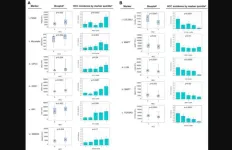(Press-News.org) ROCKVILLE, MD – Mpox, formerly known as monkeypox, is a rare viral disease that is spread through physical contact between people. Currently, testing for mpox requires lab equipment and can take a few hours to get test results. But new research suggests a way for faster testing that could be done in any clinic soon.
Md. Ahasan Ahamed, a graduate student mentored by Weihua Guan at Pennsylvania State University will present this research at the 68th Biophysical Society Annual Meeting, to be held February 10 - 14, 2024 in Philadelphia, Pennsylvania.
Though mpox symptoms are generally mild with fever, rash, and swollen lymph nodes, severe cases can occur and require medical attention. Because the disease is contagious, testing is important so that people with the disease can isolate until symptoms resolve or get appropriate medical care.
To develop a faster test, the researchers used CRISPR, the Nobel-prize winning gene editing technology. Since 2017, scientists have expanded the application of CRISPR technology from gene editing to molecular diagnostic techniques.
For this study, Ahamed created a genetic sequence combined with a reporter to specifically target the mpox virus. Then a programmable CRISPR RNA binds to both the target and a protein called Cas12a and together, the CRISPR/Cas12a cleaves the reporter to create various sizes of fragments. The researchers can then use nanopore sensing technology to analyze those reporters’ fragments, providing a rapid and accurate test that detects whether or not mpox is present in the sample.
The team confirmed that the test they created is specific to mpox—when they tested samples of cowpox virus, a close relative of mpox, the test did not show a positive result.
The whole process is quick, “in total it takes 32 to 55 minutes to detect the target, depending on viral load,” Ahamed said, which is much faster than it currently takes to test for mpox in a lab using PCR method.
The researchers plan to apply this nanopore technology to create tests for other pathogens, allowing one sample to be tested for multiple targets using portable device. And while the technology is not currently commercially available, Ahamed is hopeful that they will soon create a device that could make this kind of pathogen testing widely available.
END
Faster monkeypox (mpox) testing through CRISPR
Using gene editing proteins combined with nanopore sensing technology, new research shows that testing for pathogens could become faster and more accessible.
2024-02-10
ELSE PRESS RELEASES FROM THIS DATE:
New method could detect early ovarian cancer from urine samples
2024-02-10
New research by Joseph Reiner and colleagues at Virginia Commonwealth University shows promise for a urine-based test for ovarian cancer. Reiner will present their research at the 68th Biophysical Society Annual Meeting, to be held February 10 - 14, 2024 in Philadelphia, Pennsylvania.
Previous research showed that there are thousands of small molecules, called peptides, in the urine of people with ovarian cancer. While it is possible to detect those molecules using certain well-established techniques, ...
Scientists find new way to roll atomically thin nanosheets into scrolls
2024-02-10
Tokyo, Japan – Researchers from Tokyo Metropolitan University have come up with a new way of rolling atomically thin sheets of atoms into “nanoscrolls.” Their unique approach uses transition metal dichalcogenide sheets with a different composition on either side, realizing a tight roll that gives scrolls down to five nanometers in diameter at the center and micrometers in length. Control over nanostructure in these scrolls promises new developments in catalysis and photovoltaic devices.
Nanotechnology is giving us new tools to control the structure of materials at ...
New test for improving population-based colorectal cancer screening
2024-02-10
New test for improving population-based colorectal cancer screening
A new stool test appears to detect colorectal cancer precursors better than the current test. This could further reduce the number of new colorectal cancer cases as well as the number of people dying from the disease. A study led by the Netherlands Cancer Institute compared both tests. The results are published today in The Lancet Oncology.
Each year worldwide, approximately 1.9 million people are diagnosed with colorectal cancer, and 935,000 people ...
Quitting smoking at any age brings big health benefits, fast: study
2024-02-09
People who quit smoking see major gains in life expectancy after just a few years, according to a new study by University of Toronto researchers at Unity Health Toronto.
The study, published in NEJM Evidence, shows that smokers who quit smoking before age 40 can expect to live almost as long as those who never smoked. Those who quit at any age return close to never-smoker survival 10 years after quitting, and about half that benefit occurs within just three years.
“Quitting smoking is ridiculously effective in reducing ...
Discoveries can be used to optimize production of annatto powder
2024-02-09
Researchers at the University of São Paulo’s Luiz de Queiroz College of Agriculture (ESALQ-USP) and the Federal University of Viçosa (UFV) in Brazil have shown for the first time that bixin or annatto powder, a carotenoid pigment extracted from the seeds of the achiote or annatto tree (Bixa orellana), is not produced only in the seeds but also in other organs, and that the process intensifies in the plant’s adult phase.
An article on the study published in the Journal of Experimental Botany, also describes genetic modifications in the species that can optimize production of the pigment, which is widely used in the food ...
Harnessing human evolution to advance precision medicine
2024-02-09
Humans are still evolving, and Tatum Simonson, PhD, founder and co-director of the Center for Physiological Genomics of Low Oxygen at University of California School of Medicine, plans to use evolution to improve healthcare for all.
Her latest research, which was published February 9, 2024 in Science Advances, reveals that a gene variant in some Andean people is associated with reduced red blood cell count at high altitude, enabling them to safely live high in the mountains in low-oxygen conditions. Simonson’s UC San Diego lab is applying those findings toward understanding whether there may be a genetic component ...
For Black patients, 'representation matters' in evaluating prostate cancer websites
2024-02-09
Waltham — February 9, 2024 — For Black men with prostate cancer, racial representation is a key factor affecting trust in websites offering information on prostate cancer, reports a study in the March issue of The Journal of Urology®, an Official Journal of the American Urological Association (AUA). The journal is published in the Lippincott portfolio by Wolters Kluwer.
"Our study shows that representation matters to Black patients seeking prostate cancer information online," comments lead author Stacy Loeb, MD, MSc, PhD (Hon), of New York University Langone Health. "Not only does it impact trust in the information, but a lack ...
Having COVID-19 and Long COVID can impact women’s sex lives
2024-02-09
From work to school to socializing, COVID-19 has impacted just about every part of our lives—and now Boston University research has shown that also includes what happens in the bedroom. A study of more than 2,000 cisgender women found the coronavirus disease can impair sexual function, with long COVID having an especially detrimental effect.
“If you’re sick with COVID, you’re probably less interested in sex and maybe your body is less prepared to have sex,” says Amelia M. Stanton, a BU College of Arts & Sciences assistant ...
Mechanistically based blood proteomic markers in the TGF-β pathway stratify risk of HCC in patients with cirrhosis
2024-02-09
“A fundamental hypothesis we sought to test was whether biomarkers from the TGF-β signaling pathway might be of novel value in risk stratification of HCC in the clinical cirrhotic setting.”
BUFFALO, NY- February 9, 2024 – A new research paper was published in Genes & Cancer on February 5, 2023, entitled, “Mechanistically based blood proteomic markers in the TGF-β pathway stratify risk of hepatocellular cancer in patients with cirrhosis.”
Hepatocellular carcinoma (HCC) is the third leading cause of death from cancer worldwide but is often diagnosed at an advanced incurable stage. Yet, despite the urgent need for ...
Speed baiting: new report offers strategy for increasingly crowded Utah fishing
2024-02-09
There may, as they say, be plenty of fish in the sea — but angling opportunities on Utah’s streams, rivers and lakes are getting more crowded.
The number of anglers trying their luck on Utah waters has consistently increased over the years, meanwhile it’s getting more expensive for state managers to raise and stock gamefish and increasingly difficult to access water-based recreation during the ongoing megadrought.
Managers of fisheries in the state are being asked to do more with less these days, and they’re working more strategically to create sustainable opportunities for everyone picking up a rod and ...
LAST 30 PRESS RELEASES:
DGIST identifies “magic blueprint” for converting carbon dioxide into resources through atom-level catalyst design
COVID-19 vaccination during pregnancy may help prevent preeclampsia
Menopausal hormone therapy not linked to increased risk of death
Chronic shortage of family doctors in England, reveals BMJ analysis
Booster jabs reduce the risks of COVID-19 deaths, study finds
Screening increases survival rate for stage IV breast cancer by 60%
ACC announces inaugural fellow for the Thad and Gerry Waites Rural Cardiovascular Research Fellowship
University of Oklahoma researchers develop durable hybrid materials for faster radiation detection
Medicaid disenrollment spikes at age 19, study finds
Turning agricultural waste into advanced materials: Review highlights how torrefaction could power a sustainable carbon future
New study warns emerging pollutants in livestock and aquaculture waste may threaten ecosystems and public health
Integrated rice–aquatic farming systems may hold the key to smarter nitrogen use and lower agricultural emissions
Hope for global banana farming in genetic discovery
Mirror image pheromones help beetles swipe right
Prenatal lead exposure related to worse cognitive function in adults
Research alert: Understanding substance use across the full spectrum of sexual identity
Pekingese, Shih Tzu and Staffordshire Bull Terrier among twelve dog breeds at risk of serious breathing condition
Selected dog breeds with most breathing trouble identified in new study
Interplay of class and gender may influence social judgments differently between cultures
Pollen counts can be predicted by machine learning models using meteorological data with more than 80% accuracy even a week ahead, for both grass and birch tree pollen, which could be key in effective
Rewriting our understanding of early hominin dispersal to Eurasia
Rising simultaneous wildfire risk compromises international firefighting efforts
Honey bee "dance floors" can be accurately located with a new method, mapping where in the hive forager bees perform waggle dances to signal the location of pollen and nectar for their nestmates
Exercise and nutritional drinks can reduce the need for care in dementia
Michelson Medical Research Foundation awards $750,000 to rising immunology leaders
SfN announces Early Career Policy Ambassadors Class of 2026
Spiritual practices strongly associated with reduced risk for hazardous alcohol and drug use
Novel vaccine protects against C. diff disease and recurrence
An “electrical” circadian clock balances growth between shoots and roots
Largest study of rare skin cancer in Mexican patients shows its more complex than previously thought
[Press-News.org] Faster monkeypox (mpox) testing through CRISPRUsing gene editing proteins combined with nanopore sensing technology, new research shows that testing for pathogens could become faster and more accessible.







